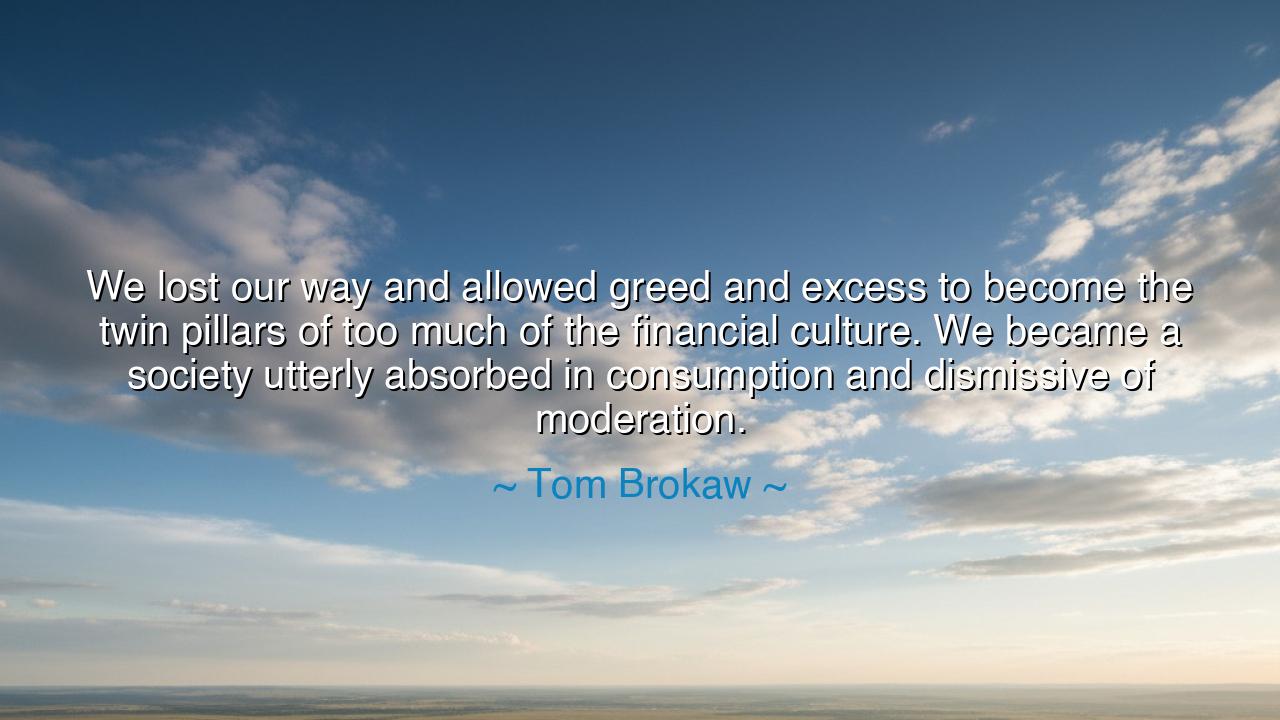
We lost our way and allowed greed and excess to become the twin
We lost our way and allowed greed and excess to become the twin pillars of too much of the financial culture. We became a society utterly absorbed in consumption and dismissive of moderation.






Hear the lament of Tom Brokaw, a voice both sorrowful and stern, as he declares: “We lost our way and allowed greed and excess to become the twin pillars of too much of the financial culture. We became a society utterly absorbed in consumption and dismissive of moderation.” These are not words of idle complaint, but the testimony of one who has watched the rise and fall of empires of wealth, and who sees in their collapse a warning to all generations. For when greed becomes the altar at which a people worship, when excess replaces balance, the soul of a nation grows sick, and its strength begins to rot from within.
The ancients knew this peril well. They told of King Midas, whose touch turned all to gold—even food, even his own daughter—until the very gift he desired became his curse. So it is with greed: what promises prosperity delivers only ruin. And excess, though it may dazzle the eye with luxury, soon weakens the spirit. The true wealth of a society is not in the abundance of possessions, but in the virtue of its people, in their courage, their justice, and their measure. When moderation is lost, no treasure can save a people from decline.
Consider the collapse of 2008, when the towers of finance, built high upon the sands of speculation, came crashing down. Banks had grown drunk on credit, investors blind with greed, and families seduced into debt by the siren song of consumption. For years, the system appeared invincible, but beneath the glittering surface lay rot. When the crisis struck, millions lost homes, jobs, and savings. The same culture that celebrated excess became the architect of despair. This is the modern echo of Brokaw’s warning: a people cannot build their future upon the unstable pillars of appetite and vanity.
And yet, this story is not new. Ancient Rome, too, grew mighty not through excess, but through discipline and sacrifice. But in its later days, wealth and luxury consumed the heart of the empire. Gladiatorial games distracted the people, lavish banquets drained the coffers, and corruption devoured the state. The citizens became spectators instead of builders, consumers instead of contributors. And when the barbarians came, the once-great empire was too weak to resist. Thus history teaches: when society is absorbed in consumption, dismissive of moderation, it becomes its own undoing.
Brokaw’s words, though grave, are also a call to renewal. He reminds us that we have not always lived thus. There were generations before us who valued sacrifice, thrift, and the common good. They endured hardship with dignity and built prosperity not on illusions but on hard work and shared responsibility. These were not perfect times, but they carried within them the spirit of moderation, the knowledge that too much is as dangerous as too little, and that balance is the path to endurance.
The lesson is clear: we must rebuild the pillars of our society not upon greed and excess, but upon integrity, responsibility, and moderation. To do so, we must question the culture that tells us to measure worth in possessions, to chase luxury while forgetting contentment. We must remember that happiness is not in the abundance of what we consume, but in the depth of what we contribute, in the strength of our families, the honesty of our labor, and the care we extend to one another.
What, then, must we do? Live with restraint in an age of excess. Save when you are tempted to spend, give when you are tempted to hoard, serve when you are tempted to take. Teach children not only how to earn, but how to use wisely. Demand from leaders and institutions not only growth, but fairness and balance. For by restoring moderation, we restore the soul of society. And in this way, we may yet turn from the path of ruin and build again a culture worthy of endurance.
Thus remember: greed and excess are pillars of sand, and those who build upon them shall see their house fall. But moderation and justice are pillars of stone, and the society that builds upon them shall endure when storms come. Brokaw’s warning is not a dirge, but a torch—if we heed it, we may yet find our way again.






AAdministratorAdministrator
Welcome, honored guests. Please leave a comment, we will respond soon